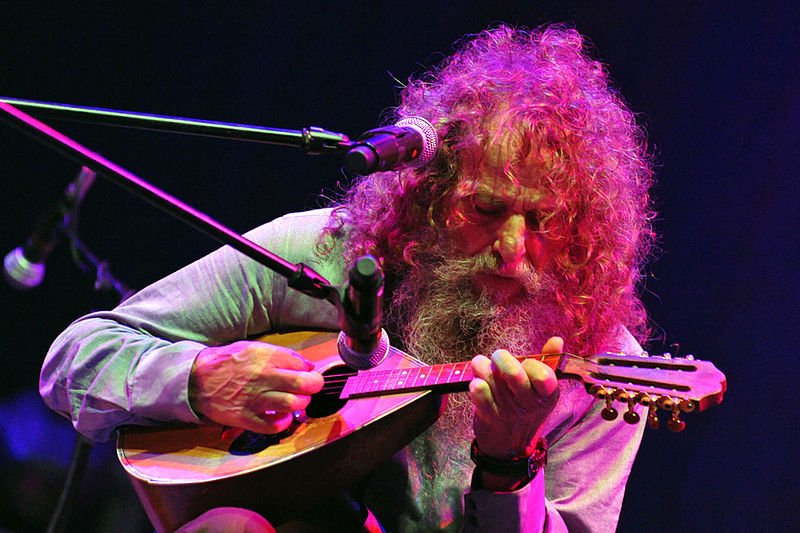I saw Psarantonis play only once, at the Amari Valley music festival almost a year ago, in a tiny mountain village on the isle of Crete surrounded by the peaks of Kedros and the towering Psiloritis. He arrived late, staggeringly drunk, glaring out at the crowd and his fellow musicians from beneath a shaggy expanse of hair and beard.
Sitting hunched over like a gnarled olive tree in the middle of the stage with his lyra – a graceful three stringed, bowed instrument, not to be confused with the harp-like lyre of ancient Greece – he began slowly to play a traditional ritizika song, a slow historical narrative about the deeds of the mighty dead, tales which his native island has in abundance.
In between berating his fellow musicians and violently bash- ing his lyra, the septuagenarian growled ferociously into the mi- crophone in his thick Cretan dia- lect, roaring ‘my roots are eagles, I will have the light of the heavens’, as the bagpipes droned on and the thundering drums struggled to keep apace. There is truly no experience in music quite like a Psarantonis performance.
His appearance of a mountain man is no deceit, Psarantonis is a native of Anogeia (literally “high-ground”) a large village on the northern slopes of Crete’s tallest mountain; razed to the ground by Nazi forces during the occupation for harbouring mountain rebels and British spies.
Indeed “mountain rebels” is the title of one of his most intriguing works. This evokes the defiance of Crete’s heroic wartime resist- ance (the Cretans were the only civilian population to engage in armed resistance against the Nazis without an army) a struggle often overlooked in histories of the war. But it also refrences the island’s seven-century long struggle against foreign oppression at the hands of the Ottomans and the Venetians.
In the song most representative of his style, the spectacular ‘Dias’, Psarantonis masterfully builds up scratchy, almost dissonant layers of lyra melodies into a tempestuous, frenzied wall of sound. As the song reaches its wildest and most unrestrained, a voice begins to emerge from the vortex of sound, clambering out like Zeus himself from the Diktean cave.
This voice is inexpressibly rough. If some speak with a gravel- like voice, Psarantonis’ is a cliff of sheer limestone. It is a voice of a parched shepherd, the war-cry of an ancient warrior, a man bellowing at God.
In a place where people are constitutionally mistrustful of politicians and intellectuals, Psarantonis is something of a legend. The religious, historical, and mythological subject matter of his songs, the connection to deep musical traditions and his undeniable authenticity are hugely appealing to generations of Cretans who have begun to lose touch with the way of life practised on that island since the times of the Minoans.
In the eyes of many he already sits in the pantheon of Crete’s greatest sons, rivalling the great Nikos Kazantzakis and Domé- nikos Theotokópoulos (known to the western world as El Greco) as an artistic titan. Considering that Cretans can number Zeus, Ariadne, and king Minos amongst their number, this is no mean feat.



